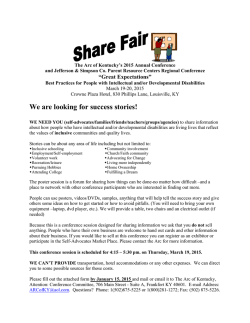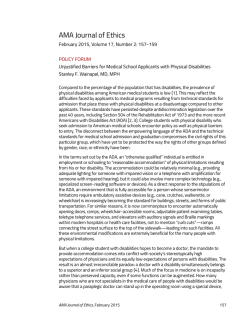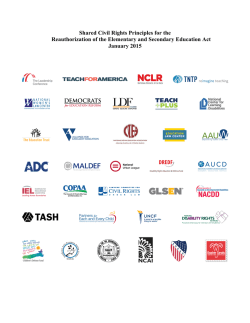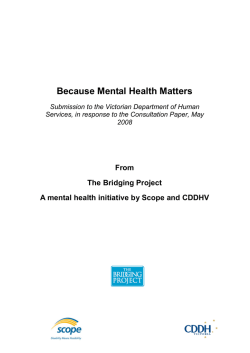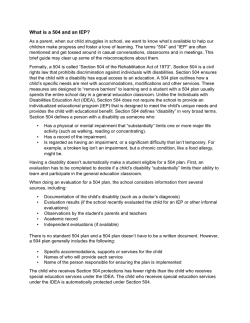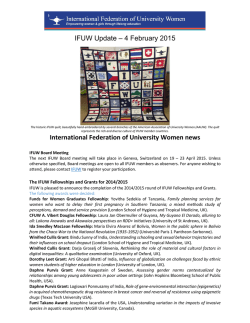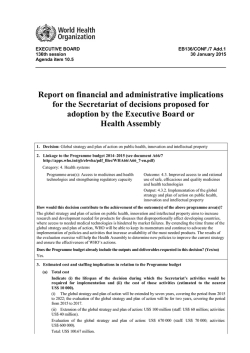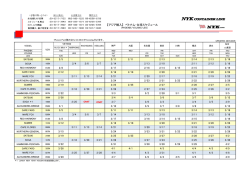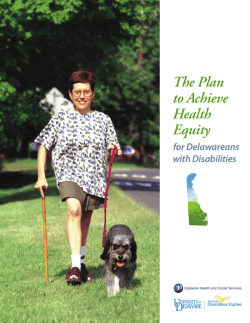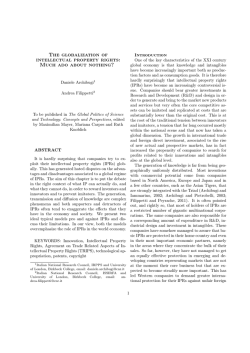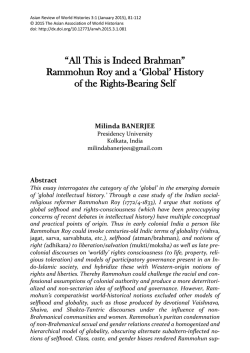
Gender-based violence against women with intellectual disabilities
Gender-based violence against women with intellectual disabilities or psychosocial disabilities: Promoting access to justice Policy Brief No 1 Centre for Disability Law and Policy, University of the Western Cape Cape Mental Health Gender, Health and Justice Research Unit, University of Cape Town Background to this project Little information is available on the nature and extent of violence against women with disabilities in South Africa. Anecdotal evidence indicates that disabled women who experience gender-based violence have inadequate access to support services from the gender-based violence sector as well as poor access to the criminal justice system itself. investigate the barriers making the South African criminal justice system less accessible to women with intellectual or psychosocial disabilities experiencing genderbased violence. It focuses on women with psychosocial and intellectual disabilities since these groups are often overlooked in both research and advocacy. This project therefore set out to Methodology Researchers conducted 58 interviews with members of organisations providing services to women with intellectual or psychosocial disabilities in both the disability sector and the gender-based violence sector in three provinces, i.e. the Western Cape, KwaZulu-Natal and Gauteng. The aim of the interviews was to examine the experiences of their clients with intellectual or psychosocial disabilities who had been victims of genderbased violence, and also to explore the experiences of the service providers in providing support to their clients, for example, through the court process. Service providers were further asked to reflect on what they perceive to be the main barriers to access to justice for women with intellectual or psychosocial disabilities. In addition, two focus group discussions were held with women with psychosocial disabilities. These discussions were also aimed at determining the barriers to access to justice, specifically facing women with psychosocial disabilities. Research conducted in Western Cape KwaZulu-Natal Gauteng Policy Brief No 1 Service Provision: Civil Society Our findings noted certain similarities among the three provinces in respect of service provision to women with intellectual or psychosocial disabilities who have experienced genderbased violence. Service providers in all three provinces reported resource and personnel constraints, with a negative impact on their capacity to provide services to these particular groups of women. Another general concern was communicating with women with disabilities, with service providers stating that their own inability to communicate may be a barrier to effectively assisting clients with intellectual and psychosocial disabilities. Researchers noted a degree of stigmatisation in both the disability and gender-based violence sectors, especially in the form of infantalisation of women with intellectual disabilities. A certain lack of knowledge of psychosocial disability was noticeable. Inadequate protective facilities to accommodate women with intellectual and psychosocial disabilities who have experienced genderbased violence (or are at risk at such violence) was raised as a major barrier to ensuring their safety. Researchers also noted gaps in the intersections between disability and gender-based violence service providers. This was less prevalent in the Western Cape, likely due to the operation of the SAVE programme (see below). Prevalence of cases The Sexual Abuse Victim Empowerment (SAVE) Programme Researchers found that service providers could provide few instances of individual cases of women with intellectual or psychosocial disabilities who had experienced gender-based violence and had reported these cases to them. Among these cases, there were hardly any that had successfully proceeded through court. SAVE is a psycho-legal programme run by Cape Mental Health aimed at people (mostly women and children) with intellectual disabilities who are complainants in sexual abuse cases. The exceptions were Cape Mental Health in the Western Cape, as a result of its SAVE programme, and another disability organisation in KwaZuluNatal with a similar programme in place. In Gauteng, it was difficult to identify any cases reported to direct or indirect service providers. The programme, which was introduced in Cape Town in 1991, provides clients with counselling, assessment and court preparation services (if the case goes to trial). Follow-up services are also provided to victims and their families. As a result of resource constraints and the range of other services they provide, most direct (disability)organisations do not see gender-based violence service provision as being in their ambit, or feel that nothing can be done, and consequently do not deal with such cases. At the same time, gender-based violence organisations felt ill-equipped to provide services to women with intellectual or psychosocial disabilities who have experienced violence. The Western Cape was again the exception here. In addition to working with a social worker, clients also see a psychologist as part of the SAVE programme. The psychologist will compile a psycholegal report, which is of particular importance to the prosecution. The SAVE programme has demonstrated its success in facilitating access to justice for complainants with intellectual disabilities. It operates with private funding. 2 Criminal Justice System Policy Brief No 1 Police response Barriers to Access to Justice: Lack of knowledge and skills on the part of criminal justice officials Availability of evidence Lack of awareness of services and rights Socio-economic circumstances Accessibility and mobility Dependency on abuser Stigma and prejudice against women with intellectual or psychosocial disabilities Regarding the police response to disability and gender-based violence, an important theme that emerged (across the three provinces) was that of a lack of knowledge of disability generally on the part of SAPS members. When it came to gender-based violence specifically, the experiences of service providers varied, depending on which police station they were working with and whether previous sensitisation work had been done with these stations. Problems experienced included that the police do not know how to deal with people with intellectual or psychosocial disabilities or do not take these cases ‘seriously’. Communication A second theme that dominated was that of communicational difficulties. This related to all aspects of the criminal justice system, including the taking of statements, medico-legal examination, pre-trial consultation with the prosecutor and plain language explanations of the procedure. This is linked to the question of whether complainants with communicational limitations would be ‘taken seriously’ or discounted from the outset. When taking statements, police are reportedly frustrated by the fact that people with intellectual disabilities may require a different style of questioning; often, police officers do not have skills, time or patience to accommodate this. Evidential aspects: Taking of the police statement Protective measures (for example, appointment of an intermediary) Competence and credibility Page 2 It was further explained that poor communication between the health care provider conducting the medico-legal examination and a victim with a disability may have an adverse impact on the case outcome. This may result in incomplete documentation such as J88 forms, which in turn may have a negative influence on the prosecution’s decision whether or not to proceed with the case. Difficulties in communication may also affect the ability of the prosecutor to have a personal consultation with a potential witness, resulting in the case being withdrawn. ‘They can’t communicate with them [clients], they don’t understand them, they don’t know how to ask the questions based on the client’s… intellectual level. They can’t do that so then that also fails… their consultation and then, you know, nothing happens.’ Where the client doesdescribing not communicate at all, service providers Caption picture or graphic. rely heavily on carers to provide information, including identification of the perpetrator. Often this is difficult, which may result in the client going back home and still being at risk in the same environment. 3 Christmas 2004 ● Volume 1, Issue 1 ● Your Family’s Name ● (242) 555-0193 Recommendations: Policy Brief No 1 A primary recommendation emerging from this study is that of training for all service providers, including criminal justice officials (police, prosecutors, health care workers and presiding officers) and both the disability and gender-based violence sectors. This training should include: A better understanding of intellectual and psychosocial disabilities Law, policies and programmes that govern, protect or support persons with intellectual or psychosocial disabilities; A clear understanding of the reasonable accommodation that may be required to – o Ensure that women with intellectual or psychosocial disabilities enjoy the right to access to justice on an equal basis with others; o Reduce secondary traumatisation. Practical skills to improve communication with women with disabilities who have experienced GBV. We also recommend that steps should be taken to address the lack of interaction between the disability and gender-based violence sectors as well as the lack of a well-developed referral network (the latter to a lesser extent applicable to the Western Cape). We also recommend adopting the following good practices: The formalisation of referral systems where criminal justice agents work together with specialised professionals. These may include, for example, psychologists who can conduct assessments, as well as professionals who are skilled in alternative and augmentative means of communication. The SAVE programme, which constitutes a ‘good practice’ should be expanded beyond the Cape Town metropolitan area, where it currently operates. In order for this to done, financial support from the South African government will be required. Sensitivity to local conditions and the requirements of a particular community will be important. We have also identified a number of aspects for legal and policy reform. Specifically, police instructions and directives to police and prosecutors are not sufficiently specific to accommodate women with intellectual and psychosocial disabilities and should therefore be expanded to address this aspect. Contact Details Prof Helene Combrinck Centre for Disability Law and Policy, UWC Tel: (021) 959 3298 Email: [email protected] Ms Talia Meer Gender Health and Justice Research Unit, UCT Supported by a grant from the Open Society Foundations. Tel: (021) 406 6947 Email: [email protected] Ms Carol Bosch Cape Mental Health Tel: (021) 447 9040 Email: [email protected] 4
© Copyright 2026
